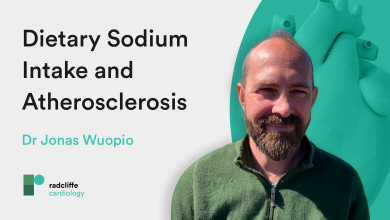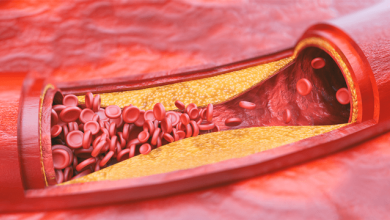Search results
Author(s):
Jonas Wuopio
Added:
1 year ago
Investigator, Dr Jonas Wuopio (Karolinska Institute, SE) outlines the findings from a study aimed to investigate the link between salt intake and carotid and coronary atherosclerosis in 10 778 participants from the Swedish SCAPIS cohort.
A recent study published in the European Heart Journal Open is the first to report the association between sodium excretion and sub-clinical coronary…
View more
Author(s):
Wolfgang Koenig
Added:
3 years ago
The notion that atherosclerosis carries features of an inflammatory disease has existed for quite some time. As early as 1856, Rudolf Virchow in his Textbook on Pathology mentioned the term “coronaritis”. Almost 150 years later, following the elucidation of major cardiovascular risk factors in the 1950s Framingham Study, Russell Ross entitled his 1999 review on mechanisms of atherosclerosis …
View more
Author(s):
Andrew Carson
Added:
3 years ago
For many years cardiovascular disease has been a major cause of morbidity and mortality across the developed world, and its incidence is also increasing in many developing countries. Indeed, it has recently been shown that even Egyptian mummies, representing the more affluent members of their society several thousand years ago, had established atherosclerosis in multiple blood vessels.1…
View more
Author(s):
Robert Dalla Pozza
,
Susanne Bechtold
Added:
3 years ago
Atherosclerosis and atherosclerosis-related complications such as coronary, cerebrovascular and peripheral arterial disease show their clinical manifestation in adulthood. However, changes at the endothelial level do not occur suddenly in the elderly, but are the result of a long, on-going, slowly evolving process. We know from autopsy studies that atherosclerotic processes begin in childhood and…
View more
Author(s):
Giuseppe Gullace
,
Hassan Khalaf
Added:
3 years ago
The endothelium, which was initially considered to be a semipermeable barrier separating lumen from vessel wall, is now recognised as a complex endocrine organ responsible for a variety of physiological processes vital for vascular homeostasis. These include the regulation of vascular tone, luminal diameter and blood flow; haemostasis and thrombolysis; platelet and leucocyte vessel-wall…
View more
Author(s):
Antoni Martínez-Rubio
,
Román Freixa Pamias
Added:
3 years ago
Hypercholesterolemia has been known for several years to be a major risk factor in the development of atherosclerosis and consecutively cardiovascular disease. This epidemiological concept has been widely confirmed using different strategies that have reduced low-density lipoprotein (LDL) levels and cardiovascular events (morbidity and mortality) in primary as well as in secondary prevention, in…
View more
Author(s):
Erkki Juhani Pesonen
,
Petru Liuba
Added:
3 years ago
Mounting evidence suggests that atherosclerosis begins in early childhood,1,2 possibly already during foetal life.3 This underscores the importance of primary prevention in early life. As many people suffering from atherosclerotic disease lack conventional risk factors (e.g. heredity, dyslipidaemia, smoking, obesity, diabetes and hypertension), interest has gradually increased in research on 'non…
View more
Author(s):
Cesare Rusconi
Added:
3 years ago
Over the last 30–40 years in most Western countries, for the first time the number of people developing coronary artery disease (CAD) and mortality rates from cardiovascular disease has gradually decreased. This reduction has been mainly achieved using nationwide atherosclerotic risk-factor control programmes. Nevertheless, cardiovascular diseases remain the major cause of premature death in the…
View more
Author(s):
Alberto Lorenzatti
Added:
2 years ago
Inflammation in Arterial Disease
Author(s):
Christos D Liapis
,
Elias A Kaperonis
Added:
3 years ago
Article












